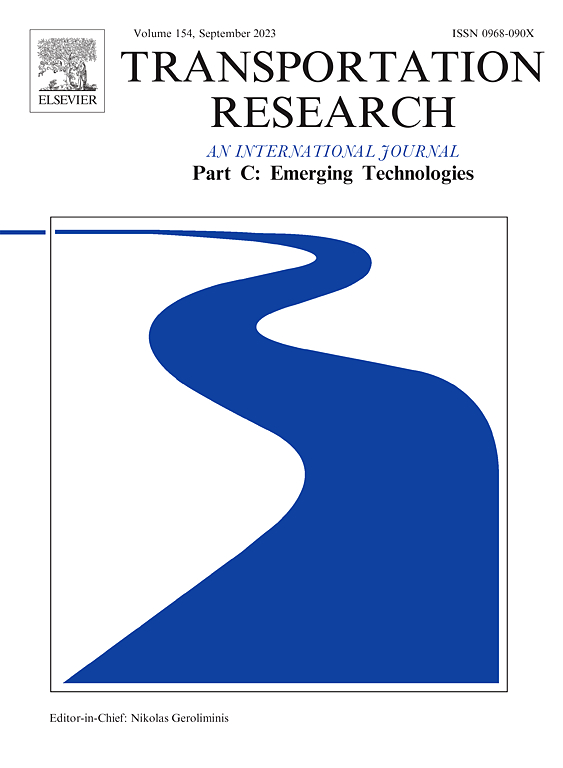Crash event detection using acoustic conformer
IF 7.6
1区 工程技术
Q1 TRANSPORTATION SCIENCE & TECHNOLOGY
Transportation Research Part C-Emerging Technologies
Pub Date : 2025-08-05
DOI:10.1016/j.trc.2025.105275
引用次数: 0
Abstract
Crash events identification and prediction plays a vital role in understanding safety conditions for transportation systems. While existing systems use traffic parameters correlated with crash data to classify and train these models, we propose the use of a novel sensory unit that can also accurately identify crash events: microphone. Audio events can be collected and analyzed to classify events such as crash. In this paper, we have demonstrated the use of an Acoustic Conformer, a convolution augmented transformer, for road event classification. The conformer is able to apprehend global features with a transformer while local features are captured by the Convolution module. Important audio parameters such as Mel Frequency Cepstral Coefficients (MFCC), log Mel-filterbank energy spectrum and Fourier Spectrum were used as feature set. Additionally, the dataset was augmented with more sample data by the use of audio augmentation techniques such as time and pitch shifting. Together with the feature extraction this data augmentation can achieve reasonable accuracy. Four events such as crash, tire skid, horn and siren sounds can be accurately identified giving indication of a road hazard that can be useful for traffic operators or paramedic. The proposed methodology can reach 83% f1-score with a recall of 85%.
使用声学共形器检测碰撞事件
碰撞事件的识别和预测对于了解交通系统的安全状况起着至关重要的作用。虽然现有系统使用与碰撞数据相关的交通参数来分类和训练这些模型,但我们建议使用一种新的感知单元,也可以准确地识别碰撞事件:麦克风。音频事件可以收集和分析,以分类事件,如崩溃。在本文中,我们演示了使用声学共形器,卷积增强变压器,用于道路事件分类。Convolution模块捕捉局部特征,Convolution模块捕捉局部特征,Convolution模块捕捉全局特征。利用Mel频率倒谱系数(MFCC)、对数Mel滤波器组能谱和傅立叶谱等重要音频参数作为特征集。此外,数据集通过使用音频增强技术(如时间和音高移动)增加了更多的样本数据。结合特征提取,该数据增强可以达到合理的精度。可以准确识别碰撞、轮胎打滑、喇叭和警笛等四种事件,为交通操作员或护理人员提供有用的道路危险指示。所提出的方法可以达到83%的f1得分,召回率为85%。
本文章由计算机程序翻译,如有差异,请以英文原文为准。
求助全文
约1分钟内获得全文
求助全文
来源期刊
CiteScore
15.80
自引率
12.00%
发文量
332
审稿时长
64 days
期刊介绍:
Transportation Research: Part C (TR_C) is dedicated to showcasing high-quality, scholarly research that delves into the development, applications, and implications of transportation systems and emerging technologies. Our focus lies not solely on individual technologies, but rather on their broader implications for the planning, design, operation, control, maintenance, and rehabilitation of transportation systems, services, and components. In essence, the intellectual core of the journal revolves around the transportation aspect rather than the technology itself. We actively encourage the integration of quantitative methods from diverse fields such as operations research, control systems, complex networks, computer science, and artificial intelligence. Join us in exploring the intersection of transportation systems and emerging technologies to drive innovation and progress in the field.

 求助内容:
求助内容: 应助结果提醒方式:
应助结果提醒方式:


